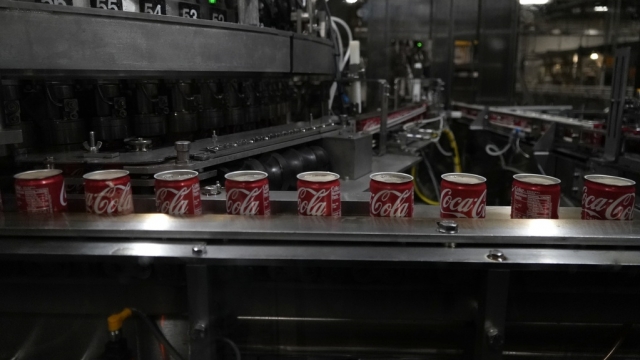It's been said that if climate change is the shark, then water is its teeth. And a global shortage of fresh water is not only a health concern, but a business one as well.
Some 2.2 billion times a day, someone in the world downs a drink made by the Coca-Cola company. While Coke's formula is a closely held secret, one ingredient is not.
"Water is the No. 1 ingredient in our product. It's important to us that we have a secure water supply," said Mike Bernier, director of sustainability for Swire Coca-Cola, USA.
In a time of climate-change-intensified drought as well as global population growth, the planet's fresh water supply is under pressure. And companies like Coca-Cola need tremendous amounts of water to stay in business.
"In order for us to ensure that we have sustainable water supplies for communities, for the environment, and for businesses, we really need the private sector to step up and steward the water resources," says Kirsten James, senior program director at Ceres.
SEE MORE: 1.5 million people have been asked to conserve water in this city
A recent report by Ceres, a nonprofit organization that tracks sustainability issues, finds some companies are making progress on water management but most have a long way to go. Of the 72 companies Ceres follows, only about a dozen are considered "on track" to meet water conservation goals by the year 2030. Coca-Cola is one of them, though the company admits there's much more work ahead.
"We're going to have to get very creative," says Bernier. "We're going to have to do more water reuse."
As much water goes into Coca-Cola drinks, most of it is used by the company in other ways: 73% flows into growing crops it puts in its beverages, like cane sugar, oranges and apples. The company says it is reducing water use on the farm through better irrigation.
"We clean our equipment, that takes water," Bernier added. "Once we clean that equipment, what can we do with that water? And we're starting to get innovative on that and that's how we're going to get to our next goal."
Bernier oversees sustainability for Swire Coca-Cola, which bottles and distributes Coke products in the western United States.
"This is an arid region, it's a drought-stricken region and will continue to be a drought-stricken region," he said. "It's imperative that if we want to stay in business and our communities want to thrive, that we continue to do our part and invest in our communities and our watersheds."
SEE MORE: Saltwater wedge in Mississippi River threatens water in New Orleans
Swire recently invested $5 million in reverse osmosis technology, a water-purification system that pushes water through a membrane.
"When we receive water from the municipality, we filter that water to meet our standards. There is a discharge from that and we lose approximately 20% from our system," said Bernier. "So what we did is install another piece of equipment to filter that water and get another percentage increase, so a total yield of approximately 90%-95% versus 80%."
The Ceres report says about 1 in 5 companies in the S&P 500 have high exposure to water challenges, led by energy industry players in oil and gas.
"Pretty much every company in every part of the globe is connected to water. And without a sustainable water supply, no company can operate and sustain itself," said James.
The Coca-Cola Company has come under fire in the past for its water use. In 2000, a Coca-Cola plant was shuttered in Kerala, India, after residents complained the local bottler was draining its water source through soft drink manufacturing.
Trending stories at Scrippsnews.com



